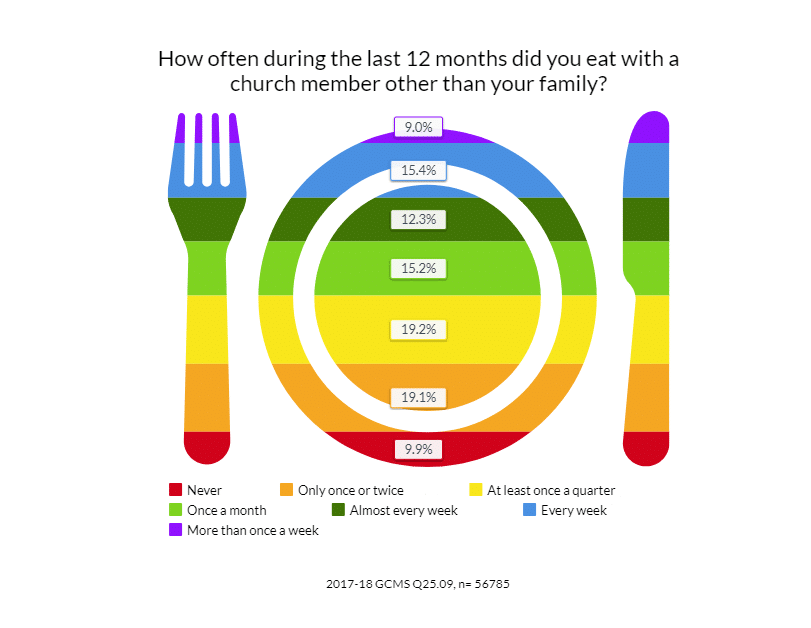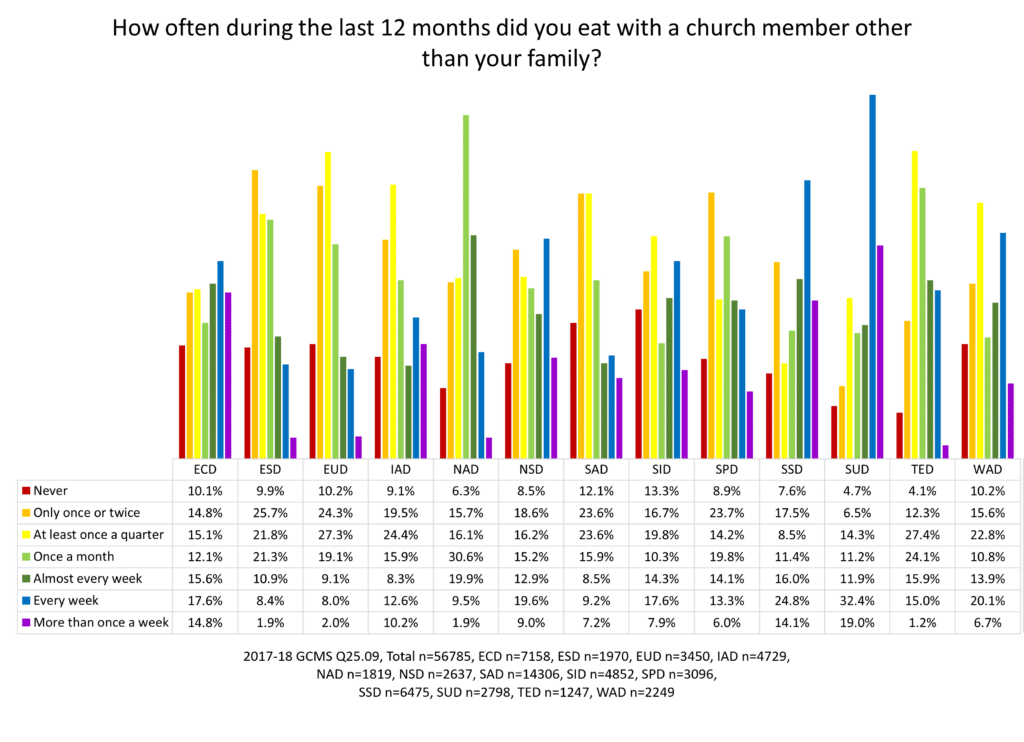In the New Testament, we see many instances of people sharing a meal together (Acts 2:42; Romans 12:13). In fact, this is a practice in which Jesus Himself often engaged (Matthew 14:13–21; Matthew 26:26–29; John 21:9–14), but did you know that there are psychological benefits to back up the practice of sharing a meal together, too?
Research shows that after just a single food sharing event, the levels of circulating oxytocin are higher and promote social bonding and higher levels of cooperation . . . That means being generous with others you don’t know very well can expand your community of support and solidifies cooperation.[1]
Global Findings on Members Eating Together
The 2017–2018 Global Church Member Survey (2017–18 GCMS) assessed church members’ experiences as part of the church body. One area surveyed was how often in the last 12 months members of the church had shared a meal with people other than their family members. (It should be noted that this survey was conducted before the COVID-19 pandemic, so there were no socially limiting precautions in place.) A quarter (24%) of respondents reported that in the last year, they had shared a meal more than once a week or every week with a fellow church member. Another 12% reported that they had done so almost every week.

However, many members reported that they had not shared a meal frequently (or at all!) with fellow church members within the last year. Fifteen percent of members reported that they had had a meal with other members once a month, 19% had done so at least once a quarter, and another 19% had done so only once or twice in the last year. Sadly, one in ten (10%) respondents admitted that, in the last year, they had never shared a meal with another church member.
Findings by Division
The data was then cross-tabulated by Division. Members in the Southern Asia Division (SUD) reported, by far, the highest percentage (51%) of eating together more than once a week or every week. The SUD was followed by the Southern Asia-Pacific Division (39%), East-Central Africa Division (32%), Northern Asia-Pacific Division (29%), and the West-Central Africa Division (27%). It is likely that these trends are present because the culture within these Divisions promotes living within community more than other regions/Divisions?

Members in the Inter-European Division (27%), Trans-European Division (27%), and Inter-American Division and the South American Division (SAD) (24% each) were most likely to have a meal with others quarterly, while members in the Euro-Asia Division (26%) and South Pacific Division (24%) were most likely to have only shared a meal with another member once or twice during the past year. Respondents from the Southern Africa-Indian Ocean Division had the highest percentage (13%) to have never shared a meal with another member, followed by SAD (12%).
Again, some of these trends may be attributed to cultural differences within the Division. However, even if they are, how can members be encouraged to step outside their comfort zone (or the comfort zone of their culture) to engage in sharing a meal with another member? Support not only from the Division or Conference level, but from the local church level, as well is needed to compel members to partake in this important, biblically-supported act.
If church members rarely have meals with one another, it can be a sign that they do not have close friends in the church. Friends provide support in good and bad times. They are a very important factor in member retention.
Has it been a while since you shared a meal with another member and/or that family? What can you do to engage with them in this way? How can you encourage other members in your church to do so? Inviting people over to your house for a meal or meeting with them during a potluck several times may also encourage others to open up their homes or their hearts. Building real relationships with other members in the congregation is so important. How can we support and trust each other if we do not know one another? Let us lead by example and invite somebody for a meal and some fellowship.
Created in collaboration with the Institute of Church Ministry.
Published by ASTR on 6/28/23.
[1] Verdolin, J. (2019). The upside of eating together. Psychology Today. https://www.psychologytoday.com/us/blog/wild-connections/201911/the-upside-eating-together
